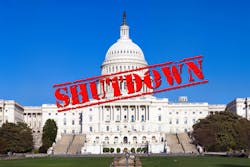Government Shutdowns Could Cost Construction Industry Millions, Hays Report Warns
Key Highlights
- Shutdowns weaken business confidence, slowing private-sector investment and hiring decisions in construction.
- Pauses in onboarding systems like E-Verify disrupt technician and subcontractor hiring processes, leading to workforce shortages.
- Contractors should implement contingency strategies such as flexible staffing and project diversification to navigate shutdown-related disruptions.
TAMPA, Florida — A new report from Hays Americas warns that U.S. government shutdowns can disrupt HVAC and construction projects nationwide, costing the industry millions of dollars in lost productivity, wages, and delayed hiring.
According to the recruitment firm, shutdowns have immediate operational impacts across the trades. Federal permitting delays, paused contracts, and halted onboarding systems such as E-Verify can stall project starts, prevent technician hiring, and freeze work on federally funded building upgrades and retrofit programs.
“While government shutdowns may seem like political events, their impact on staffing, especially in construction, is very real,” said Dave Brown, CEO of Hays Americas. “Delays in permitting, onboarding, and project funding can stall hiring and cost the industry millions.”
The analysis highlights how each shutdown in recent years has created measurable setbacks. In 2013, federal survey suspensions delayed employment data and workforce planning. The 2018–2019 shutdown — the longest on record — caused widespread permitting and contract approval backlogs. And in 2023, onboarding systems like E-Verify were paused, complicating hiring across multiple sectors, including HVACR.
Hays identified three key areas where shutdowns directly affect contractors:
-
Permitting Delays: Federal slowdowns prevent HVAC project mobilization and delay installation schedules;
-
Onboarding Interruptions: E-Verify and related systems pauses disrupt technician and subcontractor hiring; and
-
Contract Suspensions: Federal HVAC and energy-efficiency projects face immediate work stoppages.
Beyond these direct effects, Hays found that shutdowns weaken overall business confidence, slowing private-sector construction investment and hiring decisions. In regions with a large federal workforce, reduced consumer spending can also indirectly dampen demand for HVAC service, replacement, and retrofit work.
With more than 8.3 million Americans employed in construction — including 3.3 million in residential sectors — even brief shutdowns can have a widespread effect on project timelines and skilled labor deployment. For HVAC contractors managing cash flow, workforce planning, and project scheduling, understanding these risks is critical to maintaining operational stability during uncertain periods.
Hays advises contractors to develop contingency strategies that include maintaining flexible staffing plans and diversifying project portfolios to reduce exposure to federally dependent work.
For more information, visit hays.com.
Note: this release was rewritten with help from generative AI.
